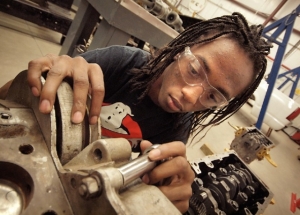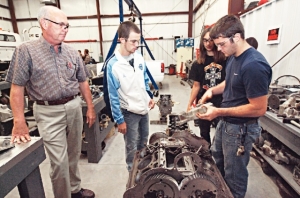Students learn trade at Southern Wayne High School's Diesel Academy
By Phyllis Moore
Published in News on October 10, 2011 1:46 PM

News-Argus/MICHAEL K. DAKOTA
Donald Forbes, a junior in the Diesel Academy at Southern Wayne High School, examines a diesel engine during class.

News-Argus/MICHAEL K. DAKOTA
Rudy West, left, director of the Diesel Academy program at Southern Wayne High School, watches his students and urges them to "consult the manual" as they learn a new engine.
DUDLEY -- Donald Forbes recalls sneaking outside as a young child to watch his father working on a truck.
Now the junior at Southern Wayne High School is getting a chance to learn the same skills with an eye toward one day making a career of it, perhaps as a diesel mechanic or in some sort of welding or collision repair.
Forbes is in his third year in the school's Diesel Academy, introduced four years ago as a vocational option for students who may not see themselves going to college on the academic track.
"The part I enjoyed most was taking the engine apart and learning the components and how to rebuild them, learning the secrets of putting it together," he said.
Brett Herring, also a junior, had seen a few programs on TV about diesel engines, but there was a personal motivation for enrolling in the courses at school.
"My stepdad drives an 18-wheeler," he said. "I thought it would be really interesting to see what he deals with on a daily basis."
It's turned out to be something he can see himself doing for the long haul.
"I love it. I love the hands-on, the difficulty. I like the challenge," he said. "I'm pretty sure I'm going to do this as a job, as a career, hopefully own my own business."
Like his classmates, junior Matthew Bolling developed an early fascination with trucks and motors.
"My family's always been mechanically savvy," he said.
When he learned that his high school was the only one locally offering a full program of courses, he was immediately on board.
"They told us it was something that nobody around us really has. It definitely sounded like something I would enjoy," he said. "(The best part) I would say is the (access) we have -- seeing all these engines, being able to take them apart and put them back together. It's a great opportunity, really."
Bolling is uncertain about his career plans, although they will likely center around something in the electronics field, he said.
"We're going to try to get me into a four-year college," he said. "Money's too tight now, but maybe Wayne Community College. But I will always have this to fall back on."
The three-year program prepares students for college, but also readies them to go directly into the job market after high school, said instructor Rudy West, who heads the Diesel Academy and has been at the school 25 years.
"They can get a job right out of high school in the field -- a diesel engine shop, heavy engine shop, farm equipment shop, anything that pertains to diesel engines," he said.
The academy features a classroom component, where students spend a good deal of time initially learning basic concepts and undergoing rigorous training about safety, before moving out into the garage area.
Once there, it's all about two things, hands-on activities to become familiar with the working parts of an engine, and the foundation for everything West hopes to impart -- put simply, "Read the manual."
It's his answer for most anything, he said.
"It's that military lock-step deal," he said. "We're going to remove the cylinder -- read the manual, follow the instructions. That way I get them to read and comprehend what they have read.
"I'm a firm believer in if a person can read and comprehend with a mechanical aptitude, regardless of what they're working on, they'll be able to work on it. There's so many people today (who) don't like to read directions or can't read directions."
The exercise, he said, is valuable for many reasons, not the least of which is to get the students to develop critical thinking skills.
"And to get them to understand that this is not an open-and-shut case," he added.
West takes a lot of pride in the certified program, in part because he was once where his students are now. Before becoming an educator, before retiring from the Army National Guard, where he was trained as a heavy equipment mechanic, and before he worked with the Department of Transportation out of Wilson, the 1970 graduate of Charles B. Aycock High School discovered his own aptitude.
"I have always enjoyed doing mechanical work," he said. "The way things worked intrigued me. ... I still like old cars, trucks, old tractors. I have got several old tractors at home, I just don't work on them."
Vocational programs, the educator maintains, are a valuable asset for any school district to have.
"We see that quite often, students that are not that interested in the academic end of school," he said. "What it does most of the time, it actually makes a little better student out of them that they'll do what is required to take those academic courses, and that's those vocational courses that they're really interested in.
"Vocational courses do a lot, in my opinion, to stem our dropout rate because not all students are interested in going to college. Just because a student is not interested in going to college does not mean that he's a low achiever by any stretch of the imagination."
Forbes said he even hopes to get some college credit while in high school to make it easier once he graduates.
"I got the highest grade in this class right here. I try to stay on point," he said. "I wanted to do something that I have fun with. Mr. West is an amazing instructor and good to get along with, a great teacher."
West said the array of students who come through vocational courses represent a wide variety of backgrounds, from honor students to those who struggle academically, but all with a certain degree of mechanical aptitude.
Senior Devon Eakes knew from the time he was little and began working on dirt bikes that he would one day go to college. Now it will more likely be an institution that features vocational courses similar to the ones he is currently taking.
"I just love working with my hands and making stuff work," he said. "(My dream job) would be just working for, like Peterbilt or anything working with my hands."
The truth is, West noted, these days trade graduates can make a lot more money than some college graduates. But educators still work hard to ensure that vocational students complete at least their high school diploma.
"I see a lot of times where the students do what they can and most of the vocational teachers try to work with the academic teachers, try to give them more time to try to keep them in school so that the academic teacher can work with them," he said. "We have a perception, the general public has a perception, that if a kid is in a vocational program (they're) not motivated to go to college. Many times, vocational teachers say that's not the case. That's not where their interest lies.
"Why not spend the money in the high schools to train these kids to be a viable, sustainable individual even if they don't go to college?"
Enrollment numbers in the program have been solid, the educator said, with between 19 and 21 students the first year and anywhere from 12 to 18 in the upper levels.
And while there are a smattering of other vocational academies popping up around Wayne and other counties -- teaching and engineering among them -- West sees the need for more.
"I would really love to see them put a vocational high school in Wayne County and have all the kids who are really interested to come," he said. "There used to be vocational training centers in the western part of the state and they got away from them."
